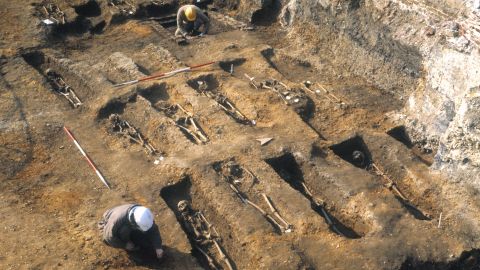Sign up for CNN’s Wonder Theory science newsletter. Explore the universe with news about fascinating discoveries, scientific breakthroughs and more.
CNN
—
The Black Death, the world’s most devastating plague outbreak, killed half of medieval Europe’s population in seven years in the 14th century, changing the course of human history.
But what about the survivors of the largest death event ever recorded? The new study was published Wednesday In the journal Nature, it says that who lives and who dies is more than just luck.
According to a study published in the journal Nature, analysis of centuries-old DNA has identified key genetic differences that helped people survive the plague in both victims and survivors of the Black Death.
These genetic differences still shape human immune systems today, with genes that once provided protection against the plague now linked to increased susceptibility to autoimmune diseases such as Crohn’s and rheumatoid arthritis, the study suggests.
“We are descendants of survivors of past epidemics … and understanding the evolutionary mechanisms that contributed to our survival is not only important from a scientific perspective, but can also inform the mechanisms and genetic determinants of disease susceptibility today.” Luis Barreiro, professor of genetic medicine at the University of Chicago, said via email.
DNA was extracted from the skeletons of three different groups during the seven-year study. In London and Denmark: Plague victims, those who died before the Black Death and those who died between 10 and 100 years after the plague struck.
More than 300 specimens came from London, including individuals buried in the East Smithfield plague pits used for mass burials at the height of the outbreak in 1348–1349, a city particularly hard hit by the plague. A further 198 samples were taken from human remains buried at five sites in Denmark.
DNA was extracted from the dentin in the roots of the individuals’ teeth, and the researchers were able to check for the presence of Yersinia pestis, the bacteria that causes plague. They then looked for signs of genetic adaptation to the disease.
“It’s a long process, but eventually you have the sequence of those genes for those individuals before, during, and after the plague, and you can ask: Are the genes carried by one population different from those carried by another population,” he said. Hendrik Poinar, a professor of anthropology at McMaster University in Hamilton, Ontario, in an email.
The team pointed out A variant of a particular gene, known as ERAP 2, has a strong association with plaque. Before the Black Death, a variant of ERAP2 was found to protect against the plague in 40% of individuals enrolled in the London study. After the Black Death, it was 50%. In Denmark, the percentage disparity was even greater – it went from 45% of samples buried before the plague to 70% afterwards.
The team still doesn’t know exactly why the variant conferred protection, but their lab tests in cultured cells showed that in those with the ERAP 2 variant, an immune cell called a macrophage triggered a very different response to Yersinia pestis, Barreiro explained. . Macrophages from individuals with the variant were better able to kill bacteria in laboratory tests than macrophages from individuals without it.
“Because the number of cases in today’s population is so low, we don’t know if it still protects against plague, but we speculate that it should,” he said. This too This variant may be beneficial against other pathogens – although this was not part of the research.

The downside of the variant is that it has been linked to a greater susceptibility to autoimmune disorders such as Crohn’s disease, where the immune system is overactive.
“It suggests that people who survived the Black Death paid “One price is to have an immune system that increases our sensitivity to react against us,” Barreiro said.
He said it’s unlikely that the Covid-19 outbreak will shape our immune system in the same way — largely because the disease is key Kills people after their reproductive age, meaning genes that provide protection for the next generation are no longer viable.
This change in the human genome, occurring over decades, is a rare example of rapid natural selection, said David Enard, a professor in the Department of Ecology and Evolutionary Biology at the University of Arizona who was not involved in the research.
“The short time window in which samples were taken and the large number of samples analyzed, the selling points of the study,” in a commentary published with the study, “allow the authors to precisely date natural selection.”
“Although evolutionary biologists have previously wondered about the possibility of natural selection during the Black Death, a proper investigation is not possible without accurate dating of many specimens.”

“Friend of animals everywhere. Devoted analyst. Total alcohol scholar. Infuriatingly humble food trailblazer.”